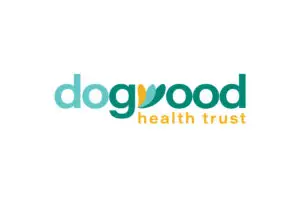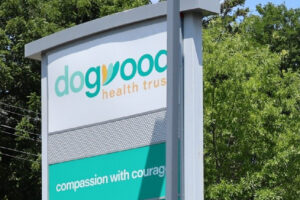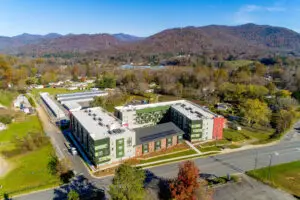Grant funding will go towards hiring a neighborhood navigator for the Shiloh community and program-related expenses.
Asheville, N.C. – The Historic Shiloh Community Association is partnering with Dogwood Health Trust and WNC Bridge Foundation to support the Shiloh community, a historically African-American neighborhood currently undergoing high levels of gentrification and displacement, in their efforts to revitalize and preserve their neighborhood through community-led initiatives. The $500,000 investment will be used to hire a culturally responsive neighborhood navigator and ultimately, support the creation of a community-based strategy addressing housing and neighborhood revitalization.



“The Shiloh Community Association is proud to be the recipient of recent funding in partnership with Dogwood Health Trust and WNC Bridge Foundation to advance our continued work of Development and Preservation in the Shiloh Community. Traditional and non-traditional funding opportunities like this promise to bolster our sustainability as an organization. We are thankful and enthusiastic for this invaluable investment,” said Sophie Dixon, president, Shiloh Community Association.
Shaniqua Simuel was recently hired to serve as the Shiloh Neighborhood Navigator. She has deep roots and a unique understanding of the neighborhood and its history, as well as a commitment to its future success. “When momma brought me home from the hospital she brought me to my beloved grandparents’ home in Shiloh, on Shiloh Rd. There I was loved and nurtured. I grew to love my neighbors and the greater community. My maternal grandfather took on several leadership roles in the community, including being president of the Shiloh Community Association. As his soul rests, I plan to learn as much as I can about the history of Shiloh, our current endeavors and our future plans. I’ll continue carrying the torch of my elders and make the best effort to preserve our evolving legacy, ” said Simuel.
“Dogwood Health Trust’s offices are located in the Shiloh community,” said Dr. Susan Mims, CEO of Dogwood Health Trust. “It’s only natural that we work with our neighbors to ask how we can support their goals and efforts around neighborhood revitalization and racial equity – both of which align with our strategic priorities and are essential components of a thriving, healthy community. We are grateful to the Shiloh community for their willingness to share their vision with our team. We listened to and sought out a valuable partner in the WNC Bridge Foundation who will provide program-related support.”
“The renewal of the Shiloh community aligns with WNC Bridge Foundation’s mission of supporting non-profits and individuals as they strengthen communities for families and children,” said Scott Buchanan, president and CEO of WNC Bridge Foundation. “The collaboration of the Shiloh Community Association, Dogwood Health Trust, and WNC Bridge Foundation is to ensure the revitalization of this historic neighborhood as an example of a social enterprise and partnership that exhibits the best in public/private work.”
In addition to this first investment into the community, Dogwood also plans to support a neighborhood study to be conducted in 2024 by Patrick Bowen of Bowen National Research. The study will provide an outline of strategies to address institutional challenges, with the goal of helping funders to make more informed decisions about future investments in the needs of the neighborhood. Bowen conducted the often referenced WNC Housing Needs Assessment from 2020.
To learn more about Shiloh, the Shiloh Community Association invites the public to attend its Black History Month Celebration on Saturday, February 10 from 1:00 – 4:00 p.m. at the Linwood Crump Shiloh Recreational Complex located at 121 Shiloh Rd. in Asheville. To learn more about the Shiloh Neighborhood Association or to reach Neighborhood Navigator, Shaniqua Simuel, contact [email protected].
###
About Shiloh Neighborhood Association
The Shilon Community Association is a 501c3 established in 2000. The neighborhood vision promotes community intergenerational relationships, interconnectedness and solidarity. The SCA and the Shiloh neighbors embrace and welcome new residents, educating them about the historical legacy and long-term vision for the future. The Shiloh vision is to have the community legacy passed down from generation to generation and preserve the original character and integrity of its ancestors.
About Dogwood Health Trust
Dogwood Health Trust is a private foundation based in Asheville, North Carolina with the sole purpose of dramatically improving the health and wellbeing of all people and communities of 18 counties and the Qualla Boundary in Western North Carolina. Dogwood Health Trust focuses on innovative and equitable ways to address the many factors that contribute to overall health and wellbeing, with a focus on housing, education, economic opportunity, and health and wellness. Dogwood Health Trust works to create a Western North Carolina where every generation can live, learn, earn and thrive, with dignity and opportunity for all, no exceptions. To learn more, please visit www.dht.org.
About WNC Bridge Foundation
WNC Bridge Foundation exists to connect our communities to a healthier future and to create lasting change through local partnerships. We support the 18 counties of Western North Carolina. To learn more visit www.wncbridge.org




